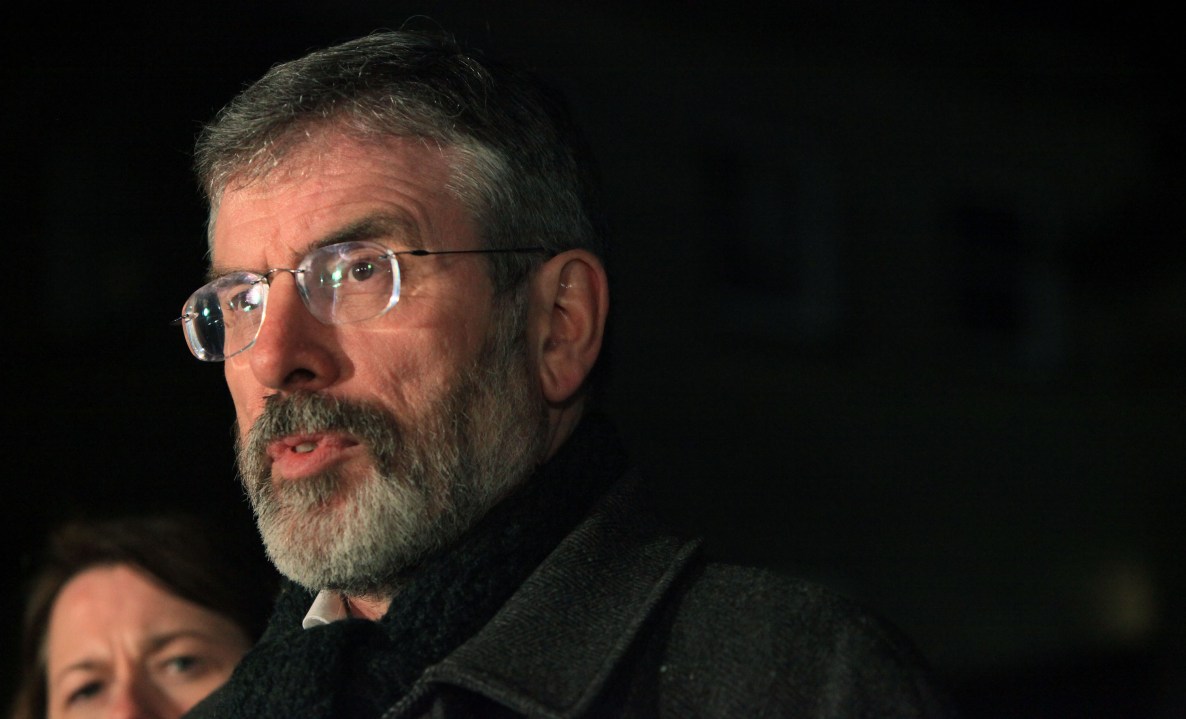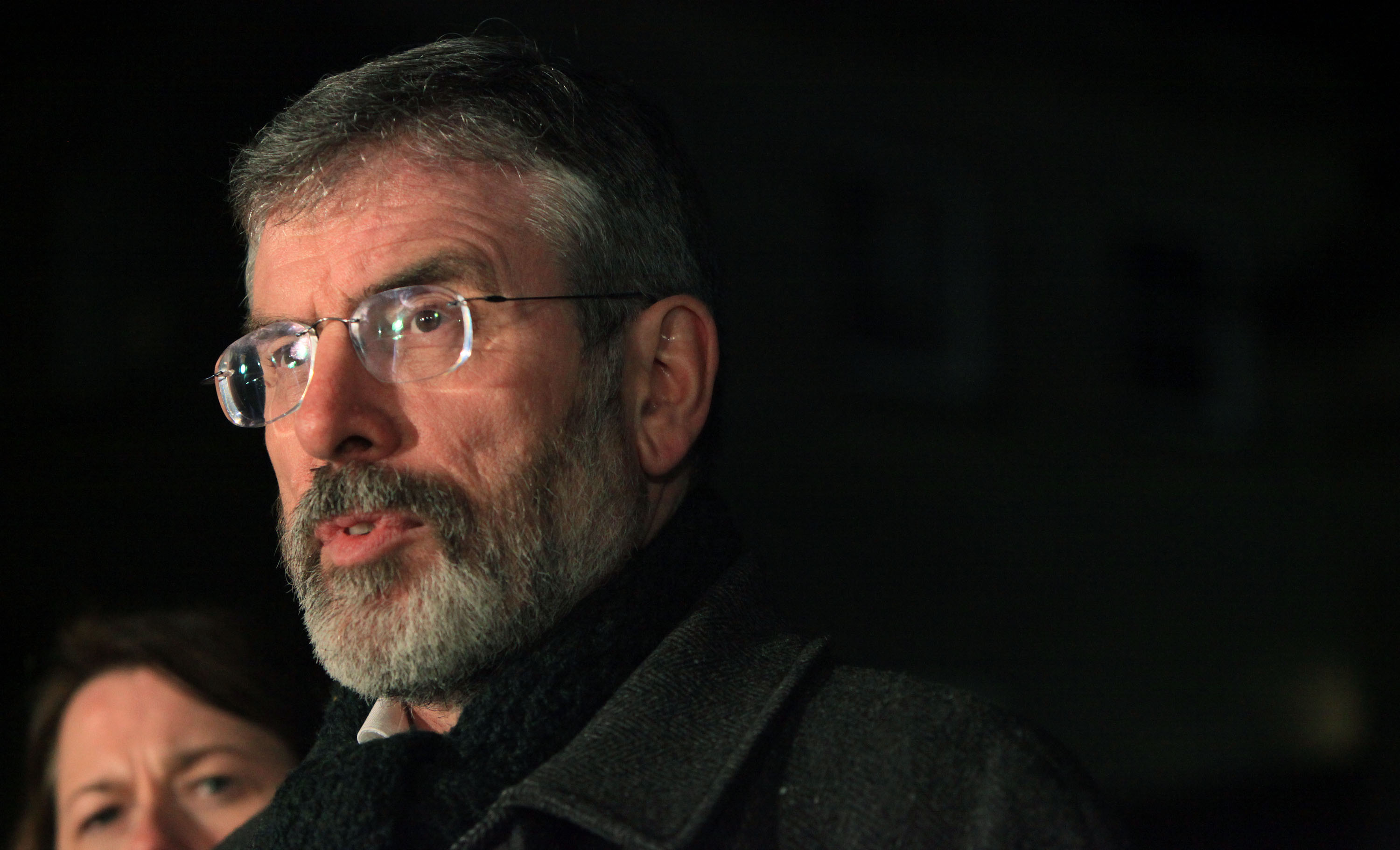I know this is not exactly breaking news but Gerry Adams is a vile man. Since no-one devotes much attention to Northern Ireland these days it is easy to forget this. Easy to file Adams and his Sinn Fein comrades into a musty drawer marked Ancient History. But the past is not another country.
In Dublin this week the Smithwick Tribunal’s report into alleged Garda collusion with the IRA in the murders of RUC officers Harry Breen and Robert Buchanan in 1989 was finally published.
The report confirmed long-held suspicions that the IRA had a mole or, less dramatically, a simple informant inside the Garda station in Dundalk, County Louth. The two policemen were murdered minutes after leaving a meeting with their Garda counterparts in Dundalk at which cross-border co-operation to combat IRA smuggling was the chief topic of discussion.
Just another squalid shooting in a squalid little war, you may say, and you would have a point. The Irish government has apologised to the Breen and Buchanan families for the likelihood that the IRA were told about the officers’ movements by a source inside the Garda Siochana.
But it is the reaction of Gerry Adams and Sinn Fein that, a quarter of a century after the murders, remains noteworthy. They haven’t gone away you know. According to Adams, the two RUC officers were asking for trouble. They invited their own execution. Speaking to a Dublin radio station Adams said:
“The former IRA volunteers said that one of the officers was spotted coming from the station, that they then used a house overlooking the station, to monitor comings and goings… So when you have that type of laissez faire disregard for their own security by both An Garda Siochana in relation to these two RUC officers and more importantly by the RUC officers themselves. Here they were in the heart of south Armagh, in the middle of a very, very severe conflict at that time and seemed to think that they were immune to attack by the IRA and tragically as it turned out for them, that wasn’t the case.”
That tragically as it turned out for them is a typically neat piece of Adamsian humbug isn’t it? As always, blame the victim and slide away from any responsibility for anything. It’s always tragic when hard things happen but you can’t blame the people who held the guns. Or the people who commanded the people who held the guns. The IRA, you say? Well, listen, what you have to understand is…
Actually, all you need understand is that Gerry Adams still has a pathological aversion to acknowledging his own past. He remains a moral dwarf. And aren’t we supposed to have moved on from that anyway? Besides, he was careful to note, he is “sure the same thing happened to IRA volunteers”. Doubtless it did. Doubtless the poor volunteers shot on active service might sometimes have taken greater precautions to ensure their own safety.
It is tiresome that some people are still impertinent enough to draw a distinction between the forces of law and order – however imperfect they might have been – and the actions of a terrorist group who represented no-one other than themselves. Most people lack Gerry Adams’ infinitely flexible powers of moral equivalence.
Not that Adams is alone. His entire party remains rotten to its core and incapable of addressing, far less overcoming, its murderous past. (Please, let’s not pretend Sinn Fein and the IRA were distinct entities.) In a remarkable edition of Tonight with Vincent Brown – which you can watch here – Sinn Fein’s Justice spokesman Padraig MacLochlainn maintained that the IRA were blameless.
According to MacLochlainn, you see, the IRA members who murdered Breen and Buchanan “had a duty as much as Michael Collins and the IRA of the War of Independence, as much as Padraig Pearse and James Connolly“. The IRA “had a right to take a war in the absence of political leadership” and, anyway, the “RUC were a sectarian, orange state enforcer” and, for god’s sake, this was a “war situation” that was “tragically the same as the old IRA who killed almost 500 RIC (Royal Irish Constabulary) members in the War on Independence.”
Again with the tragically. Terrible how these things just happened. But, jaysus, don’t be trying to pin responsibility for any of this on the people who made it happen. That wouldn’t be right.
But why, you might ask, does any of this matter? Isn’t it the same old dreary same old? To some extent it is, but it is also a reminder that Sinn Fein want to own Irish history and, by owning it, corrupt it. And that does matter because the corruption fouls all waters.
Whatever one thinks of the Easter Rising there is little denying that by the time of the War of Independence Collins and Co enjoyed a significant measure of popular support. The cause drew strength from that popular enthusiasm. That might not, on its own, be enough to justify the measures taken but even if we accept the comparison on these terms the contrast between Irish enthusiasm for the War of Independence and Irish enthusiasm for the modern Provisionals reflects pitifully on Adams and Co. In Northern Ireland they represented a minority of a minority; in the Republic they were an embarrassment whenever they weren’t an irrelevance.
But to listen to these people you could be forgiven for thinking they were the authentic voices of Irish nationalism. Forgiven for supposing there were no alternatives to the armed struggle. Except of course there were and those alternatives were followed by the majority of northern nationalists and the overwhelming majority of southern Irish men and women.
So this is not simply a question of corrupting Irish history it is also an attempt to steal it. It is their biggest heist yet. Sinn Fein don’t only wish to own the north’s story, they want to be seen as the representatives of all Ireland and the inheritors of all strains of nationalist sentiment. It shouldn’t wash but it might.
The further pity of it is that we – that is, the British government – have allowed and even, in some instances, encouraged this theft. Because the present division of power in Northern Ireland is so embarrassing we all agree not to mention it. Above all we agree not to acknowledge that it represents a tremendous failure of the peace process, not its triumphant success.
If, in 1992, you had said to the Irish people, north and south of the border, that the peace process would leave Northern Ireland to be carved up and shared between Sinn Fein and the DUP most people would, quite correctly, have demanded a different, better, process. Instead we have ended up with that precise failure but chosen to term it a success.
Even if you think it is a success it is a very heavily qualified success. Better that than nothing, many people will say and, as so often, they will have half a point. But only half a point. The peace process hollowed out the centre of Northern Irish politics. That is regrettable enough, still worse is the manner in which the British government colluded in the evisceration of the SDLP and the UUP.
It did so by elevating the process above its outcome. So long as the process continued, however imperfectly, all would be, if not well, at least tolerable. The process became sacred and everything else could be sacrificed to keep the process alive.
The Republican movement recognised this and appreciated how this belief – however well-intentioned it might be – stacked the deck in their favour. There were no good faith negotiations because Sinn Fein and the IRA knew that they would not be held to the letter or even the spirit of their commitments. Everyone else would be, however. At every crisis – whether over prisoner release or decommissioning or any number of other matters – Sinn Fein would slide away from its commitments and, far from holding them to these commitments, the British and Irish governments would redefine the process to render those commitments irrelevant. Keeping the ship afloat was all that mattered. The course did not.
The British government – and here the likes of Mo Mowlam and Jonathan Powell must take much of the blame – always blinked. Since failure was not an option any outcome could be redefined as a success.
It is true, I suppose, that a deal could not be done without Sinn Fein and the IRA. At least not the kind of epic, history-making deal politicians sought. But that had the effect of giving Sinn Fein a de facto veto. Worse still, it emasculated the SDLP and, more generally, the entire constitutional nationalist cause. They were saps. Who could be bothered with boring old Seamus Mallon when you could enjoy the thrill of talking with the hard men of the IRA? And anyway, weren’t the hard men the only people who counted?
They were not but the British government behaved as though they were. In return for conceding they had lost the war Sinn Fein and the IRA won the peace. They did not only win it, they were handed it. Keys on a plate. Because otherwise, you know, the process might have faltered. And that was the one thing that could not be permitted.
Which is why we now endure the sight of Gerry Adams and his chums parading themselves as big men big enough to make a historic bargain and old warriors arguing that bygones be bygones and all the rest of it. Besides, there was blood on all sides and who’s to say one murder is worse than another? Ancient history.
But, again, it is not ancient history as Sinn Fein’s attempt to rewrite and steal Irish history demonstrates. If you think this does not matter then you’re the kind of person for whom truth is also an irrelevance. But I like to think we can be better than that, even if only a little better.
There may be a kind of peace in Ulster these days and we may recognise the benefits that come from that but we should not be deluded or so blind as to fail to recognise its shortcomings. Just because it has turned out this way does not mean it had to turn out this way.
In that sense, I suppose we should be grateful to Gerry Adams this week if only for reminding us who he really is and what kind of political party he leads. Even so, I imagine we will soon agree to forget about all of that because, well, the human heart can only bear so many hard truths.








Comments